 | |
| Author | Sindiwe Magona |
|---|---|
| Country | South Africa |
| Language | English |
| Genre | Epistolary novel |
| Publisher |
|
Publication date |
|
| Pages |
|
| ISBN | 978-0-8070-0949-9 |
| Followed by | play adaptation |
Mother to Mother is an epistolary novel by South African writer Sindiwe Magona.
 | |
| Author | Sindiwe Magona |
|---|---|
| Country | South Africa |
| Language | English |
| Genre | Epistolary novel |
| Publisher |
|
Publication date |
|
| Pages |
|
| ISBN | 978-0-8070-0949-9 |
| Followed by | play adaptation |
Mother to Mother is an epistolary novel by South African writer Sindiwe Magona.
As stated in the novel's preface, the fictional story of Mother to Mother is based on the real events from 1993 peaking in Amy Biehl's death in Cape Town's Gugulethu. [1]
The story is told by Mandisa, mother of Mxolisi, who has killed an (unnamed) daughter of the addressee, another (unnamed) mother. It is switched between several layers of time - Mandisa's youth around 1968, Mxolisi's youth and the present. The twelve numbered chapters feature occasional subheadings, usually consisting of times or place names and dates, all set around Gugulethu in August 1993. Among them are Mowbray and Gungululu. Only the first chapter is written as an obvious letter, in which Mandisa, the first-person speaker, directly talks to the addressee. This narrative situation is kept up again at the end, when the addressee is spoken to directly.
In between the English story appear words marked in italics: e.g. terms like hokkie, bhuti, Bajita, mlungu , Ewe ... or whole phrases in Xhosa language. [1]
Chapter 1 starts off with Mandisa Ntloko addressing the mother (Linda Biehl) of a murdered young woman (Amy Biehl). Mandisa's son Mxolisi has been involved in the killing, over which she expresses her condolences. By telling the story of Mandisa's own upbringing and the childhood and youth of Mxolisi, she would like to cast light on their troubled circumstances, deeply interrelated with apartheid, racial segregation, police violence and brutality, injustice, institutionalised poverty and marginalisation. She says about the young killers' that their world and "environment failed to nurture them in the higher ideals of humanity and [that these young men] instead, became lost creatures of malice and destruction." [1] : v Even "parents teach their children to hate all whites." [2] Mandisa depicts her living situation in Guguletu. She is living with her three children (her sons Mxolisi, 20 and Lunga, 14, and her daughter Siziwe) in a hut. Mandisa works as a maid in a white household for Mrs. Nelson. The differences between the two women's wealthy fortune are quite apart from each other. When Mandisa returns home, she hears about violence in her township, which is common, only one person has died apparently. When she finds her oldest son not at home, Mandisa is worried in fear of him being one of the killers. Later, the police brutally raid her home, beating up her children. In between the chapters, flashbacks take the reader back to Mandisa's childhood. Living quite happily with her father (Tata) and her mother (Mama) and her grandparents around (Tata's father and Makhulu, Tata's mother). In 1968 she is forced out of her hometown, following chaotic and troubled circumstances. Mandisa's brother Khaya eventually marries Mandisa's school friend Nono and they have a child. In fear of Mandisa becoming pregnant as well, she is being sent to live with her grandmother Makhulu away. Her boyfriend China, though, is getting her pregnant by accident in her teenage years, despite not sleeping together. Being a virgin is quite important to her mother, embarrassingly examining her hymen. After Mxolisi's birth, China is trying to provide for the family and they marry on Father Mark Savage's urging, but China leaves her eventually after she has been living with his family, her in-laws, though merely working as a housemaid for them. She leaves as well and, with her next partner Lungile, has her son Lunga, and, later, her daughter Siziwe with Dwadwa, her second husband. Mxolisi's life is not less troubled. His teenage friends Mzamo and Zazi are shot by police in front of his eyes, leaving him deeply disturbed, wetting his bed and not being able to talk for some time, until his stepfather Lungile forces him to eat a mouse. Mxolisi follows Lungile's example, who leaves to become a freedom fighter, and engages with street gangs, for which he quits school (Liberation now, education later and One Settler, One Bullet are some of their slogans). Mandisa has a talk with her Tatomkhulu about how whites took their land and left them with nothing. Deep down, Mxolisi knows that despite him being good at school, he doesn't have any job prospects. In the streets, Mxolisi seems to be popular and brave, saving a girl from being raped. Later, he is with rioters in the streets, who throw stones at a young white woman's car and stab her when she tries to get away. Mandisa and even her other children are outcasts in her community due to Mxolisi being a murderer. [1] [2] [3] [4] [5] [6]
The novel Mother to Mother has been praised for its contribution to bringing ethnicities together and promoting understanding of institutional injustice, such as apartheid. [7] It has been placed on reading lists in secondary schools and higher education courses. In Germany's state Lower Saxony it has been officially chosen as an essential novel to read for the Abitur exam in English in 2022 and 2023. [2] [8]

Eileen Mary Challans, known by her pen name Mary Renault, was a British writer best known for her historical novels set in ancient Greece.
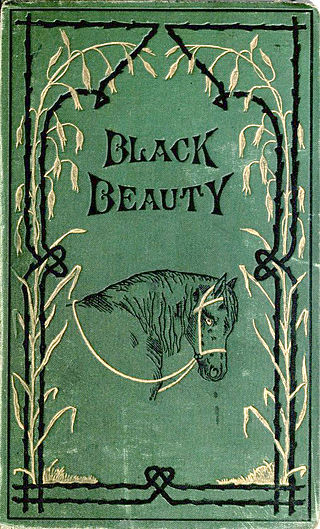
Black Beauty: His Grooms and Companions, the Autobiography of a Horse is an 1877 novel by English author Anna Sewell. It was composed in the last years of her life, during which she was bedridden and seriously ill. The novel became an immediate best-seller, with Sewell dying just five months after its publication, but having lived long enough to see her only novel become a success. With fifty million copies sold, Black Beauty is one of the best-selling books of all time.
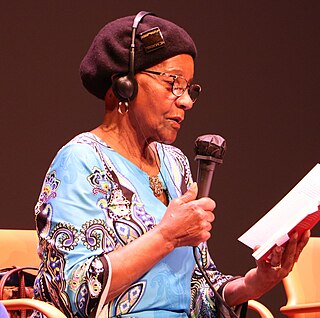
Sindiwe Magona is a South African writer.
The poetry of South Africa covers a broad range of themes, forms and styles. This article discusses the context that contemporary poets have come from and identifies the major poets of South Africa, their works and influence.
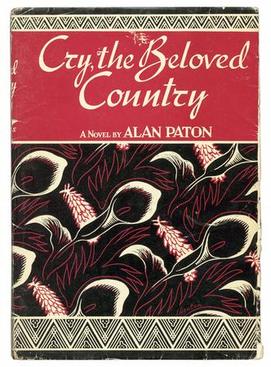
Cry, the Beloved Country is a 1948 novel by South African writer Alan Paton. Set in the prelude to apartheid in South Africa, it follows a black village priest and a white farmer who must deal with news of a murder.

Out of the Dust is a children's verse novel by Karen Hesse, first published on January 1, 1997.

Gugulethu is a township in the Western Cape, South Africa and is 15 km from Cape Town. Its name is a contraction of igugu lethu, which is Xhosa for our pride. The township was established along with Nyanga in the 1960s.

Netochka Nezvanova is an unfinished novel by Fyodor Dostoevsky. It was originally intended as a large scale work in the form of a 'confession', but a background sketch of the eponymous heroine's childhood and adolescence is all that was completed and published. According to translator Jane Kentish, this first publication was intended as "no more than a prologue to the novel". Dostoevsky began work on the novel in 1848 and the first completed section was published at the end of 1849. Further work was prevented by the author's arrest and exile to a Siberian detention camp for his part in the activities of the Petrashevsky Circle. After his return in 1859, Dostoevsky never resumed work on Netochka Nezvanova, leaving this fragment forever incomplete.

Amy Elizabeth Biehl was a Fulbright Scholar and American graduate of Stanford University and an anti-Apartheid activist in Zimbabwe who was murdered by Cape Town residents while a black mob shouted anti-white slurs. The four men convicted of her murder were granted amnesty by the Truth and Reconciliation Commission.

South African literature is the literature of South Africa, which has 11 national languages: Afrikaans, English, Zulu, Xhosa, Sotho, Pedi, Tswana, Venda, Swazi, Tsonga and Ndebele.

Beka Lamb is the debut novel from Belizean writer Zee Edgell, published in 1982 as part of the Heinemann Caribbean Writers Series. It won the Fawcett Society Book Prize in 1982 and was one of the first novels from Belize to gain international recognition. In 2022, it was included on the "Big Jubilee Read" list of 70 books by Commonwealth authors, selected to celebrate the Platinum Jubilee of Elizabeth II.
Beverley Naidoo is a South African author of children's books who lives in the UK. Her first three novels featured life in South Africa where she lived until her twenties. She has also written a biography of the trade unionist Neil Aggett.
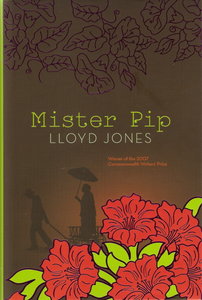
Mister Pip (2006) is a novel by Lloyd Jones, a New Zealand author. It is named after the chief character in, and shaped by the plot of Charles Dickens' novel Great Expectations. The novel was adapted into the film Mr. Pip in 2012.
There is a wide range of ways in which people have represented apartheid in popular culture. During (1948–1994) and following the apartheid era in South Africa, apartheid has been referenced in many books, films, and other forms of art and literature.
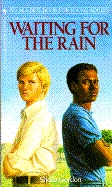
Waiting for the Rain is a young adult novel by South African-born American writer Sheila Gordon, first published in 1987. It tells the story of two boys, one black and one white, growing up on a farm in South Africa during apartheid. As the boys mature, their friendship dissipates because the black boy seeks political equality while the white boy wants everything to stay the same.
The Gugulethu Seven was an anti-apartheid group of men between the ages of 16 and 23 that were shot and killed on 3 March 1986 by members of the South African Police force. The seven men included Mandla Simon Mxinwa, Zanisile Zenith Mjobo, Zola Alfred Swelani, Godfrey Jabulani Miya, Christopher Piet, Themba Mlifi and Zabonke John Konile. It was later uncovered that the police operation that unearthed the Gugulethu Seven's plans had been in the works for some time.
Joan Riley is a Jamaican-British writer. Her 1985 debut novel The Unbelonging made her "the first Afro-Caribbean woman author to write about the experiences of Blacks in England".
Mandisa Monakali is a public speaker, educator, social worker, researcher, lobbyist, advocate, project manager, strategic planner, workshop and community organizer. She is the founder and Executive Director of Ilitha Labantu.
Thembi Mtshali-Jones, is a South African actress. Considered as one of South Africa's most celebrated artists, Thembi is notable for the roles in the several popular television serials including Sgudi 'Snaysi, Stokvel, Silent Witness and Imbewu. Apart from acting, she is also a renowned singer, playwright and Associate Teaching Artist at Global Arts Corps in Kosovo as well as a trainer in Cambodia.
Good Madam is a South African horror film, directed by Jenna Cato Bass and released in 2021. A commentary on the contemporary state of race relations in South Africa in the years following the end of apartheid, the film stars Chumisa Cosa as Tsidi, a single mother who moves back in with her mother Mavis while her mother is working as a live-in caregiver to an elderly white woman.